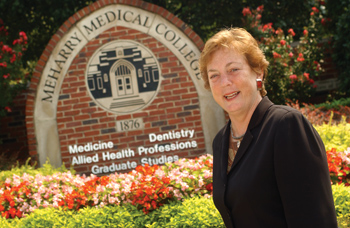
Lee Limbird, Ph.D., is taking an expanded role at Meharry Medical College as vice president for Research and chair of the Department of Biomedical Sciences.
photo by Dana Johnson
Limbird dives into new role at Meharry
While teaching graduate students at Meharry Medical College as an adjunct faculty member in the early 1990's, Lee Limbird, Ph.D., professor and former chair of Pharmacology at Vanderbilt, acknowledged her frustration and even anger at the discrepancies in the resources available at both institutions.
Limbird, who retired from Vanderbilt in 2004 after serving 25 years, was the first associate vice chancellor for Research at Vanderbilt University Medical Center. Although she was certain that she had left biomedical research and training behind upon her departure, she began serving as an adviser to John Maupin, D.D.S., president of Meharry Medical College, and PonJola Coney, M.D., dean of the Meharry School of Medicine. That experience sowed the seed for what has become Limbird's newest endeavor — vice president for Research and chair of a new Department of Biomedical Sciences at Meharry.
As a consultant to Maupin and Coney, Limbird met with faculty, staff and administrative leaders to discuss their shared vision for Meharry and what barriers the faculty, staff and trainees felt were interfering with achieving that vision.
“In an effort to address the issue raised by everyone about being spread too thin with too many responsibilities, the idea for faculty to commit their efforts principally to one mission was created,” Limbird said. “And with a new medical school curriculum with organ-based interdisciplinary teaching modules, a new organization of the basic sciences along disease entities and biomedical problems was also created.”
The Department of Biomedical Sciences, the new basic sciences arm at Meharry, has four research-focused divisions: cancer biology, cardiovascular biology, microbial pathogenesis and the immune response and neurobiology and neurotoxicology.
“The principal roles for faculty members in these divisions are to lead strong research programs that serve as venues for training of graduate students and postdoctoral fellows,” Limbird said. “Alignment along these problem-solving areas is intended to foster stronger interactions among the basic science faculty and their clinical counterparts addressing the same biomedical problems.”
Another newly created component of that department, the Division of Professional Education, is focused on the training of professional students including medical, dental and allied health students.
“Since the training of graduate students in a strong research environment and the training of the next generation of physicians and dentists are alignments that are tenurable, Meharry has made a strong statement about the importance of both of these missions of their institution,” Limbird said.
Limbird is also serving as vice president for Research at Meharry, with a goal of strengthening the infrastructure for research from bench to bedside to community.
“Meharry, because of its historic links to the community, is poised to effectively bring new clinical findings and their importance in prevention and treatment to patients in community health centers and engage them in the research that will ultimately change the quality of life and health of all Americans.”
Limbird sees herself not as a dictator of research directions, but rather as a liaison or matchmaker, linking faculty with similar interests in synergistic interactions and seeking support for some critical infrastructure enhancements.
“As the first, and still the only, private historically black medical school in our country, Meharry has a laudable and critical mission to serve, which is to address the unconscionable health disparities in our country,” she said. “The focus of faculty research on issues of disparities is, of course, of importance to meeting Meharry's mission.
“But equally, if not more important is the training of so many African-American and other minorities as physicians, dentists, and young scientists. Meharry's development of the careers of minorities will contribute, in the future, to addressing at the scientific as well as at the clinical level the embarrassing differences in health outcomes for those isolated by poverty, too many of whom are people of color. I feel privileged to be a part of this mission.”
Limbird said it is an exciting time to be at Meharry with the new curriculum for medical students, and faculty who are passionate about the success of the program. Also exciting at Meharry are the visions of some key new leaders of scientific programs who have careers with demonstrated success in achieving those missions.
For example, the Center for Excellence in HIV/AIDS Health Disparities is being led by James E. Hildreth, M.D., Ph.D., who recently joined Meharry after 20 years on the faculty at Johns Hopkins University; and the new Center for Women's Health Research, the only program in the country focusing on issues of concern for women of color, was recently launched by Meharry and is led by Valerie Montgomery Rice, M.D., chair of the Department of OB/GYN and a graduate of Harvard Medical School.
“I thoroughly enjoy being able to interact directly with students, share with faculty their excitement for research and offer some advice born out of experience, and also to teach — something I hadn't realized how much I had missed.”













